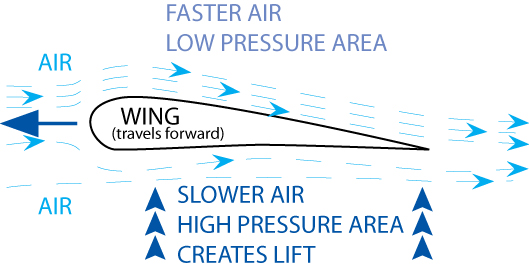A wing is made to let the air under the wing have a higher pressure than the air over the wing. It has an Airfoil. As Tommy moves along the runway gaining speed, the wind under the wing will gain pressure as speed increases. When the pressure, which is measured in pounds per square feet, is greater than the weight of the airplane, then Tommy will begin to fly.
Try this the next time your parents take you for a drive. With their permission, safely put your hand outside of the car window with your palm facing down. As the car accelerates you will notice that the wind under your hand will slowly increase to where the wind will support your hand and you will not need to hold it up.
Then try raising just the front of your hand. You will notice that the wind will force your hand to rise. You have now experienced Lift and what happens to a wing as it speeds down the runway and takes flight. Your hand is flying!

Explanations:
- Airfoil- Any surface which provides an aerodynamic force when it interacts with a moving stream of air.
- Lift- An upward force created by airflow as it passes under a wing.
- Square Foot- The area formed by a square 12 inches long by 12 inches wide.
- Tommy’s maximum takeoff weight is 6000 pounds. His wing is 42 feet, ¼ inch long. It has 258 square feet. So, Tommy needs to have just over 23 pounds of lift per square foot of wing area. 6000lbs, divided by 258ft = 23.25ft/lbs
Tommy Merchandise
Buy Tommy Merchandise such as keychains, backpacks, water bottles and stickers in our Café Press store.
Join Tommy’s Hangar
to receive special updates, exclusive illustrations, and other fun things exclusive to members!
